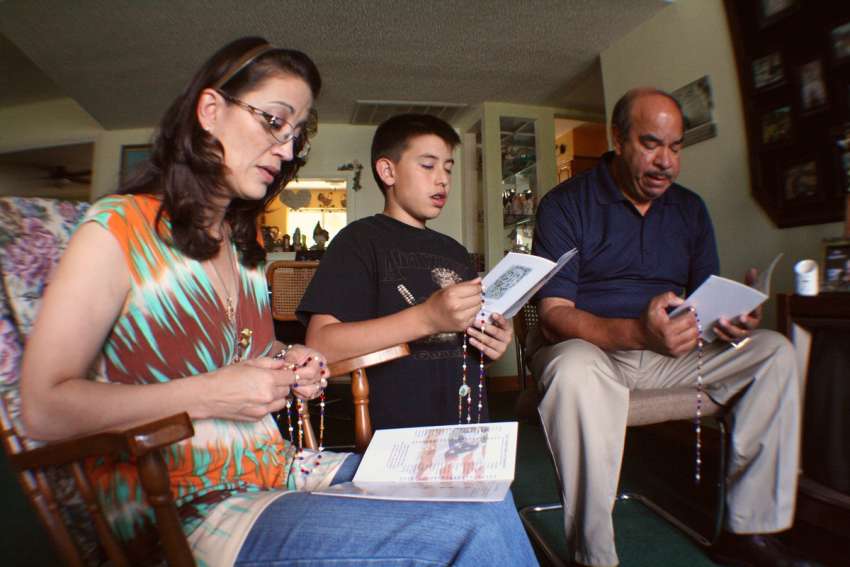The survey also showed that 30% of Catholic parents say it is somewhat important to them, while 34% say it is not too important or not at all important.
"This study is concerning in that it points to an ambivalence that many people involved in pastoral ministry see so much among our families," Susan M. Timoney, associate professor of practice, pastoral studies area, and associate dean for undergraduate studies at The Catholic University of America's School of Theology and Religious Studies in Washington, told Our Sunday Visitor, the weekly newspaper of OSV based in Huntington, Indiana.
"Parents want their children to be 'good people,' which is inclusive of many elements of a Catholic worldview, but what parents seem to struggle doing is sharing a conviction about the importance of practicing the (Catholic) faith and speaking to a personal relationship with God," Timoney said. "It calls for a spiritual renewal among parents and families."
The numbers come as part of a larger survey of 3,757 U.S. parents with children younger than 18, conducted last fall. An analysis of that survey, published on Feb. 6, focused on religious and ethnic differences in parenting among Protestants and Catholics.
Greg Popcak, director of CatholicCounselors.com, a pastoral telecounseling practice, suggested that the findings are due to the lack of impact people believe faith and religious practice have on their daily lives and relationships, especially family relationships.
"Most people see faith and religious involvement as something that complicates their relationships more than it benefits them," he said. "At best, church is one more thing to do in an already busy life. At worst, it asks me to follow rules that I fail to see having any positive impact on the quality of my relationships."
He highlighted efforts such as the CatholicHOM (Households on Mission) app, a digital family formation platform for Catholic families launched by his practice, as important for both the future of Catholic family life and the future of the church itself.
"Unless we can show people how our Catholic faith helps people lead more loving, connected, caring lives -- especially in their families -- most people will find no compelling reason to celebrate the faith themselves or encourage their children to own it," Popcak said.
Joseph White, a child and family psychologist and the associate publisher for catechetical resources at OSV, found it "especially striking" that a third of Catholic parents do not consider it important to pass on their faith.
"I think this highlights the need for evangelization of Catholic adults," White said. "The issue here is not just that Catholic adults don't 'know' their faith; they don't see why their children would 'need' it."
He said this represents not only a failure to catechize but also a failure to evangelize. In response, he called for a refocus on the "kerygma" -- which he described as the core message of the Gospel -- to help Catholics discover or rediscover why they and their children need Jesus and the church.
He encouraged the refocus not only for adults, but also for children.
"When we fall in love with someone, we want to know everything about them," he said. "If we can help our children see the need for Jesus and the church in their lives, to understand what Jesus has done for them and who he is, they will want to know everything about him and will want to be active in his church."
In many areas of Pew's analysis, responses by Catholic parents resembled the responses of U.S. parents in general.
The percentage of Catholic parents and the percentage of all parents who say it is extremely or very important that their children have similar religious beliefs to their own as adults is the same: 35%. Of all parents, 22% say it is somewhat important and 42% say it is not too or not at all important.
The majority of U.S. parents (81%) and Catholic parents (81%) find it extremely or very important for their children to grow up to become people who help others in need, according to the analysis. The majority of U.S. parents (80%) and Catholic parents (79%) also say it is extremely or very important for their children to grow up to be accepting of people who are different from them.
Parents' answers changed depending on how often they attend religious services or Mass, according to Pew. U.S. parents who attend religious services at least once a week are more than three times as likely to consider it important to raise children who will share their religious views.
With two-thirds of Catholic parents saying it is at least somewhat important that their kids share their religious beliefs as adults, White recommended that ministry leaders in Catholic parishes and schools consider what evidence-based tools they can give parents to ensure that the Catholic faith is handed on to the next generation.
"We need to use this knowledge to help parents who want to raise their children as lifelong disciples of Jesus," he said. "This is a primary responsibility of the parish. Pope Francis calls us to be 'a family of families,' and we need to work harder to ensure that the family stays together."


